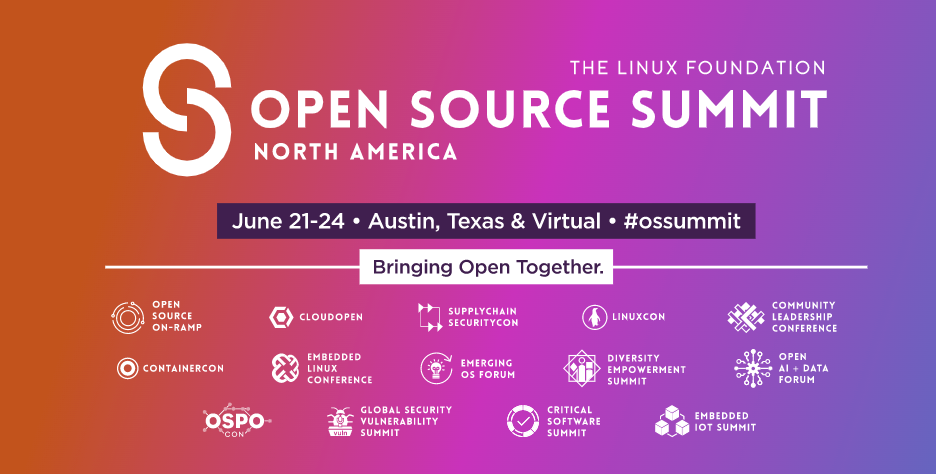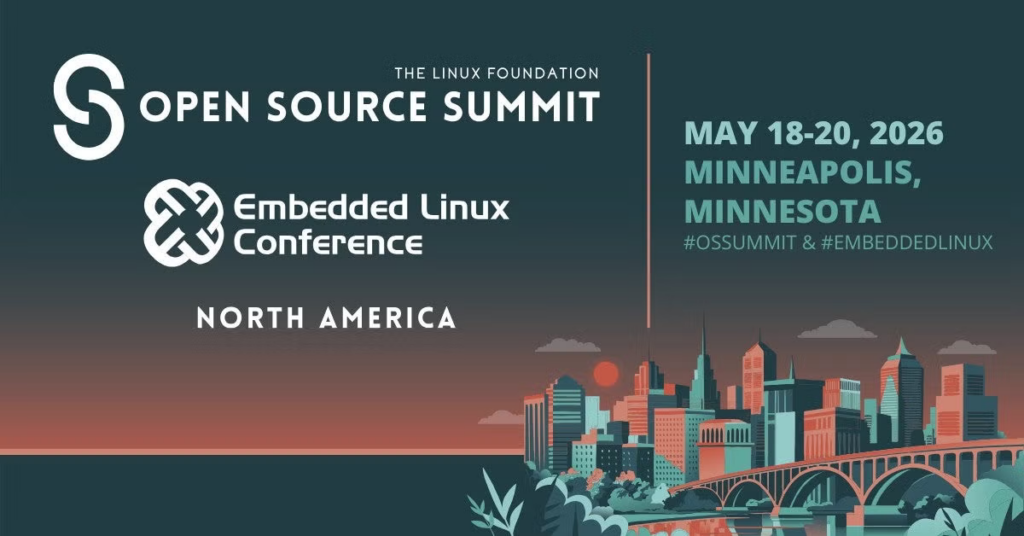
- This event has passed.
Embedded Linux Conference (Austin, TX + Virtual)

This year, Open Source Summit North America is the premier event for open source developers, technologists, and community leaders to collaborate, share information, solve problems, and gain knowledge, furthering open source innovation and ensuring a sustainable open source ecosystem. It is the gathering place for open-source code and community contributors. Open Source Summit is a conference umbrella, composed of a collection of events covering the most important technologies, topics, and issues affecting open source today – including Embedded Linux Conference and Critical Software Summit.
To register for the event for an in-person or virtual attendance, click here on the main event site.
The ELISA Project will be represented in several sessions at the conference.
On Wednesday, June 22:
1:45 -2:25 pm: Enabling Linux in Safety Applications (panel discussion)
Moderator: Jeffrey Osier-Mixon, Red Hat (ELISA Ambassador)
Panelists: Gabriele Paoloni, Red Hat (ELISA board chair) Kate Stewart, Linux Foundation (ELISA Executive Director) Paul Albertella, CodeThink (Open Source Engineering Process) Elana Copperman, Intel (Linux Features) Philipp Ahmann, Bosch GmbH (Automotive) Milan Lakhani, Codethink (Medical Devices)
Meeting business and safety objectives while building safety critical applications is a huge challenge for any industry, particularly those who have not had previous experience with open source and Linux. ELISA’s charter is to help industries navigate technical and non-technical challenges in order to bring the benefits of open source to safety applications and help organizations provide the rigor needed for certification. This panel features ELISA working group leads who will share their vision of making Linux a prominent player for FuSa applications in several industries. Join us to learn more about the project and how you can contribute to the community’s overall success. Add this to your schedule here.
1:45 – 2:25 pm: Finding the Path from Embedded to Edge using Product Lines
Speakers: Steffen Evers, Bosch.IO & Philipp Ahmann, Robert Bosch GmBH
Linux is used for many embedded device classes today. However, it is increasingly desirable to connect these devices with each other and with the cloud. Embedded container technology can be used to make this easier by merging server/cloud and embedded technologies. However, it also leads to more challenges e.g. in respect to security, safety, traceability, and SBOMs. Using Linux across multiple device classes and product lines, and adding cloud technology, causes the complexity and efforts to explode.
In this talk, we describe how Bosch, and others, use embedded containers and “reference systems” to avoid redundant work and get a large number of embedded projects under control.
A reference system is an adjustable compilation of tools along with a pre-configured bundle of packages for a common use case and defined set of devices. This reuse significantly reduces development and maintenance costs, and speeds up the time to market. In this way, reference systems can form the base for your product lines.
Bosch uses the in-house Debian-based embedded distribution “Apertis” as the basis for several reference systems, e.g. for automotive infotainment systems. In doing so we push as many efforts as possible from individual projects into Apertis, as the meta-layer. Thereby, the users can focus more on the actual functionality and applications. e.g. one issue that we have addressed in the context of software management is the handling of GPLv3 in embedded devices. Another topic has been mainline support for kernel drivers.
Add this to your schedule here.
On Thursday, June 23:
1:15-1:35 pm: Ask the Experts Session with Kate Stewart on SPDX, Safety Critical Software & Embedded Systems
Sit down with open source experts to gain knowledge 1:1 and ask all your pressing questions! No sign-up necessary – just stop by!
2:05-2:45 pm: BOF: SBOMs for Embedded Systems: What’s Working? What’s Not?
With the recent focus on improving Cybersecurity in IoT & Embedded, the expectation that a Software Bill of Materials (SBOM) can be produced, is becoming the norm. Having a clear understanding of the software running on an embedded system, especially in safety critical applications, like medical devices, energy infrastructure, etc. has become essential. Regulatory authorities have recognized this and are starting to expect it as a condition for engagement. This BOF will provide an overview of the emerging regulatory landscape, as well as examples of how SBOMs are already being generated today for embedded systems by open source projects such as Zephyr, Yocto and others, followed by a discussion of the gaps folks are seeing in practice, and ways we might tackle them.
2:55-3:35 pm: Static Partitioning with Xen, LinuxRT, and Zephyr: A Concrete End-to-end Example – Stefano Stabellini, AMD
